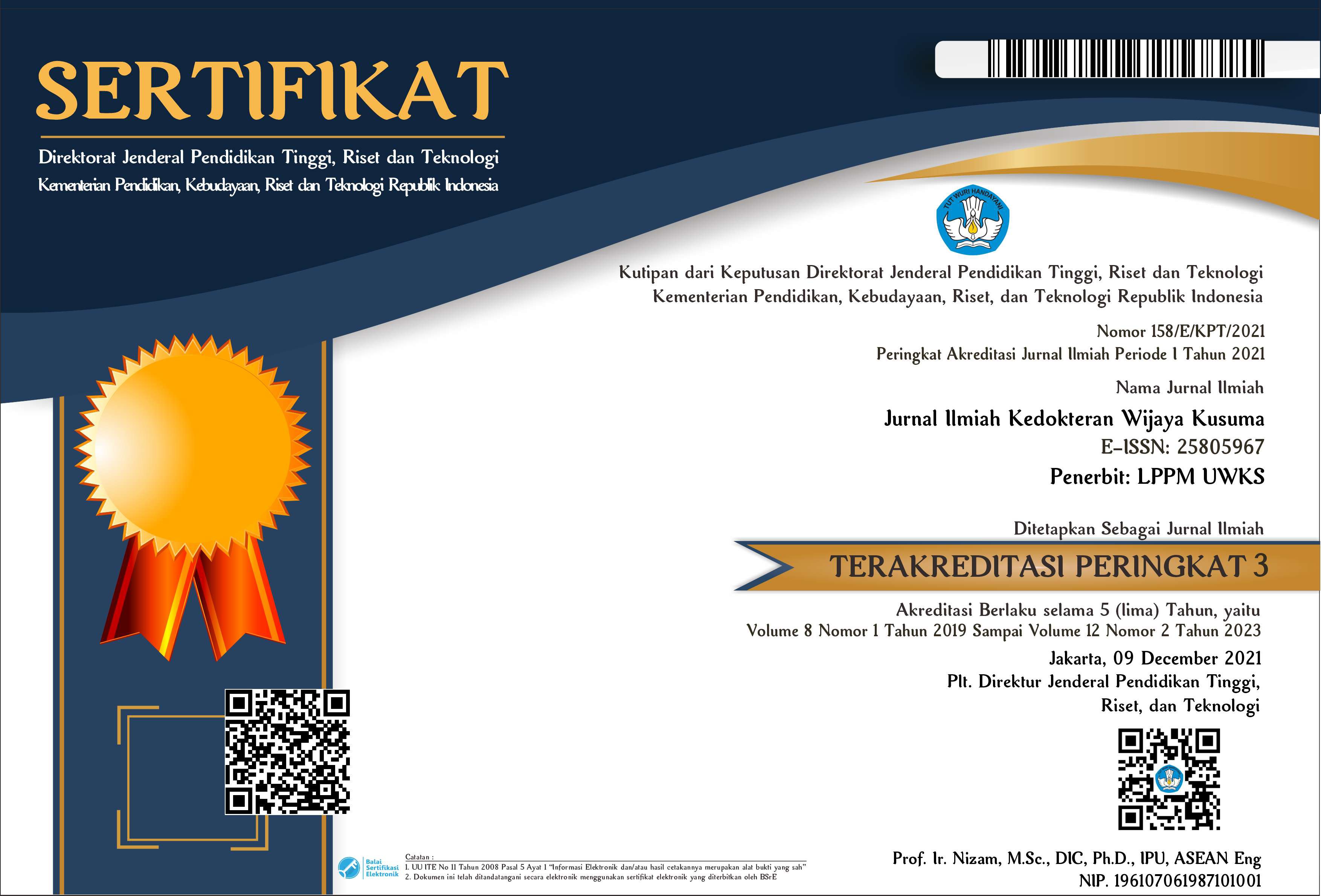Analisis Ekspresi Protein TLR-9, CD90 dan VEGF pada Mesenchymal Stem Cell di Jaringan Tumor Osteosarkoma
DOI:
https://doi.org/10.30742/jikw.v8i2.625Keywords:
TLR-9, CD90, VEGF, mesenchymal stem cellAbstract
For further investigation on the effect of Mesenchymal Stem Cell (MSC) on tumor / cancer growth, it is necessary to start with tumor MSC profile from tumor / cancer tissue. In this study, we use MSC from osteosarcoma tissue as a representative. The MSC profile analysis method used were the comparing the phenotype and characteristics of MSC fromosteosarcoma tissue with MSC from normal adiposa tissue. The characteristics of MSC were represented by protein expression of several candidate genes namely TLR-9, CD-90 and VEGF. From the results of immunofluorescence staining on adiposa MSC compared withosteosarcoma MSC, it has obviously seen that although the phenotypes were similar, there was no significant difference in CD-90 expression in osteosarcoma MSC and adiposa MSC. Although VEGF expression appears to be slightly prominent in osteosarcoma MSCs, the difference between the two was also not significant. Whereas TLR9 expression is very prominent in osteosarcoma MSC and significantly different from adiposa MSC. Thus TLR9 may be of concern in subsequent studies to investigate the mechanism of MSC triggers tumor growth.
References
Ades EW, Zwerner RK, Acton RT, and Balch CM, 1980. Isolation and partial characterization of the human homologue of Thy-1. Journal of Experimental Medicine, 151: 400-406.
Beckermann B, Kallifatidis G, Groth A, Frommhold D, Apel A, et al, 2008. VEGF expression by mesenchymal stem cells contributes to angiogenesis in pancreatic carcinoma. British journal of cancer, 99(4): 622-631.
Du X, Poltorak A, Wei Y, and Beutler B, 2000. Three novel mammalian toll-like receptors: gene structure, expression, and evolution. European cytokine network, 11(3): 362-71.
Hernanda PY, Pedroza-Gonzales A, van der Laan LJW, Janssen HLA, Peppelenbosch MP, and Pan Q, 2013a. 1050 Human Liver Carcinomas Recruit Mesenchymal Stem/Stromal Cells That Can Promote Tumor Growth Via Paracrine Signaling. Journal of Hepatology, 58: S431-S431.
Hernanda PY, Pedroza-Gonzalez A, Sprengers D, Peppelenbosch MP, and Pan Q, 2014. Multipotent mesenchymal stromal cells in liver cancer: implications for tumor biology and therapy. Biochim Biophys Acta, 1846(2): 439-45.
Hernanda PY, Pedroza-Gonzalez A, van der Laan LJ, Broker ME, Hoogduijn MJ, et al, 2013b. Tumor promotion through the mesenchymal stem cell compartment in human hepatocellular carcinoma. Carcinogenesis, 34: 2330-40.
Horwitz EM, Le Blanc K, Dominici M, Mueller I, Slaper-Cortenbach I, Marini FC, Deans RJ, et al and International Society for Cellular Therapy, 2005. Clarification of the nomenclature for MSC: The International Society for Cellular Therapy position statement. Cytotherapy, 7(5): 393-5.
Huynh PT, Beswick EJ, Coronado YA, Johnson P, O'Connell MR, Watts T, et al, 2016. CD 90+ stromal cells are the major source of ILâ€6, which supports cancer stemâ€like cells and inflammation in colorectal cancer. International journal of cancer, 138(8): 1971-1981.
Liu S, Ginestier SC, Ou SJ, Clouthier SG, Patel SH, Monville F, et al, 2011. Breast cancer stem cells are regulated by mesenchymal stem cells through cytokine networks. Cancer research, 71(2): 614-24.
Martinez-Campos C, Burguete-Garcia AI, and Madrid-Marina V, 2017. Role of TLR9 in Oncogenic Virus-Produced Cancer. Viral Immunol, 30 (2): 98-105.
Senger DR, Galli SJ, Dvorak AM, Perruzzi CA, Harvey VS, and Dvorak HF, 1983. Tumor cells secrete a vascular permeability factor that promotes accumulation of ascites fluid. Science, 219(4587): 983-985.
Sobacchi C, Palagano E, Villa A, and Menale C, 2017. Soluble Factors on Stage to Direct Mesenchymal Stem Cells Fate. Front Bioeng Biotechnol, 5, 32.
Vineis P, Illari P and Russo F, 2017. Causality in cancer research: a journey through models in molecular epidemiology and their philosophical interpretation. Emerg Themes Epidemiol, 14: 7.
Xie T and Li L, 2007. Stem cells and their niche: an inseparable relationship. The Company of Biologists Ltd.
Zhao H and Peehl DM, 2009. Tumorâ€promoting phenotype of CD90hi prostate cancerâ€associated fibroblasts. The Prostate, 69(9): 991-1000
Downloads
Published
Issue
Section
License
The journal operates an Open Access policy under a Creative Commons Attribution-NonCommercial 4.0 International License. Author continues to retain the copyright if the article is published in this journal. The publisher will only need publishing rights. (CC-BY-NC 4.0)

















